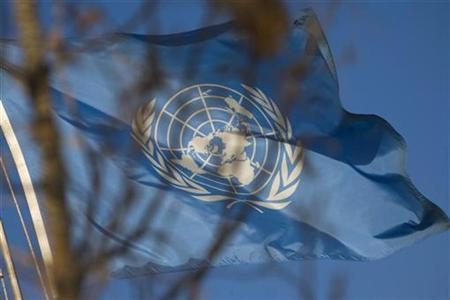U.N. Official Says Leaders Want Fast Climate Deal
Country: US
Author: Richard Cowan

A United Nations flag is raised at the United
Nations multi-agency compound near Herat November 5, 2009.
Photo: Morteza Nikoubazl
WASHINGTON - World leaders are setting their sights on completing an international deal on combating global warming by the middle of next year, a U.N. official said on Thursday, now that there is broad agreement next month's deadline will not be met in Copenhagen.
With hope all but gone that December's international climate change summit in Copenhagen will reach a final deal on new goals for reducing emissions of carbon dioxide and other greenhouse gases, negotiators are focusing on when such a pact can realistically be produced.
Janos Pasztor, climate adviser to U.N. Secretary-General Ban Ki-moon, told reporters that Ban "has consulted with a number of heads of state and so far the general feeling seems to be that we should try to complete the job earlier than later." He added, "So, more like the six months than the 12" for additional negotiations.
Whether it is six or 12 more months of intensive work on a climate change deal depends largely on when next year the United States Senate can pass domestic legislation reducing the country's carbon pollution from smokestacks.
Democratic leaders in the Senate had hoped the full Senate would have passed a bill by December 7, when the Copenhagen summit is set to begin. But the effort has become bogged down, with U.S. lawmakers preoccupied with healthcare reform legislation and many also hesitant during economic hard times to pass a climate change bill that would raise energy prices.
Asked during the telephone press conference why a six-month extension might not be enough time, Pasztor said, "If the U.S. Senate is not able to move forward in early spring, then we're back in the same situation, so we need to take that into account."
While Copenhagen is not expected to produce a deal that's ready for participating countries to ratify, Pasztor said the summit in the Danish capital still can produce a detailed framework.
AIM FOR COPENHAGEN
Asked whether Ban expects the Copenhagen summit to nail down emission-reduction targets, the amount and type of aid developing countries would offer to poor nations and other details, Pasztor answered: "Yes. That's exactly what is the expectation and that is what we feel that is possible."
The United States, the world's second largest carbon polluter, is the only developed country to have failed so far to commit to specific emission reductions. But a bill passed by the U.S. House of Representatives would set a 17 percent reduction by 2020, from 2005 levels, and 83 percent by 2050.
Similar legislation approved by a Senate committee calls for a 20 percent cut by 2020. But many senators want a less ambitious plan, possibly in the range of 14-17 percent.
Without a proposal by the United States, other countries attending the Copenhagen summit are unlikely to move forward.
Alden Meyer, who works on climate change issues for the Union of Concerned Scientists, said U.S. negotiators are "actively considering" several options for Copenhagen, including offering up a "provisional target subject to final action by Congress," proposing a target range or a minimum goal.
Both Pasztor and Meyer agreed that whatever carbon emission goals countries settle on next month or next year, governments later on will have to "ratchet up" their efforts to avoid the worst effects of rising temperatures that bring polar ice melting, drought, flooding, famine and the spread of disease.
(Editing by Cynthia Osterman)
© Thomson Reuters 2009 All rights reserved
